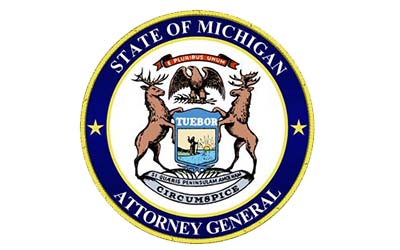
Orion Township ZBA Meeting of June 14, 2021



|
Media Contact: Lynsey Mukomel FOR IMMEDIATE RELEASE: AG Nessel Commends Senate, House for Recognition of Elder Abuse Awareness Day and MonthLANSING – Michigan Attorney General Dana Nessel commended the Michigan Senate and House of Representatives for recognizing the importance of Elder Abuse. On June 8, the Senate adopted Senate Resolution 62 “I want to thank both chambers for recognizing the importance of elder abuse awareness, an often unnoticed and unreported issue,” Nessel said. “In order to properly protect our aging population, we must be able to recognize the signs of abuse. Our Elder Abuse Task Force has a number of resources available online to help identify physical and emotional abuse, neglect and financial exploitation of seniors.” The Task Force launched in 2019 and consists of more than 55 different organizations in the public, private and nonprofit sections – all working together to combat elder abuse. Last week, Nessel joined with a bipartisan group of state legislators from both chambers to announce legislation implementing fundamental reforms impacting guardians and conservators. These bills are the result of more than two years of work and, if passed by the legislature, would implement the remainder of the Task Force’s Initiatives. For more information on the Elder Abuse Task Force, visit the Task Force’s webpage. To report elder abuse, call 855-444-3911. If you or someone you know is being abused or neglected in a nursing facility, contact the Michigan Attorney General’s Health Care Fraud Hotline at (800) 24-ABUSE (2-2873) or file a complaint online through the Michigan Attorney General Patient Abuse Complaint Form. |

|
Media Contact: Lynsey Mukomel FOR IMMEDIATE RELEASE: AG Nessel, DIFS Remind Consumers to Watch Out for Callers Claiming to be from Health DepartmentsLANSING – Michigan Attorney General Dana Nessel is reissuing a consumer alert in partnership with the Michigan Department of Insurance and Financial Services (DIFS), warning Michiganders to beware of health care scammers – this time, claiming to be a representative from the “U.S. Department of Health Insurance Plans for Citizens” offering health insurance plans at a discount. Last month, Nessel warned of scammers claiming to be from state or local health departments as well as vaccination clinics, asking for personal information. “Bad actors continue to take advantage of this pandemic by any means possible,” Nessel said. “Be wary of unsolicited calls claiming to be from state, local, or federal health departments offering discounted health insurance. The latest scam uses President Biden’s new healthcare policy in an effort to obtain your personal information like a social security number or Medicare number.” If you receive an unsolicited call from someone saying they represent a local, state or federal agency, be skeptical and trust your instincts. Hang up if they claim to be from a government agency and:
These types of scams often contact residents through a robocall. Because many reputable companies use telemarketing to conduct business using live-call telemarketers or automated robocalls, criminals will also use this method in an effort to steal personal or banking information. You can learn more about warning signs through the Attorney General’s Consumer Alert on robocalls. DIFS regulates the insurance and financial services industries in Michigan, and operates the Fraud Investigation Unit (FIU) dedicated to the prevention of criminal and fraudulent activities in the insurance and financial services markets. Consumers can report suspected insurance fraud, including suspected health insurance fraud scams, to the FIU on the DIFS website. “The current Marketplace special enrollment period, which is open until August 15, is an important opportunity for Michiganders to get comprehensive and affordable health insurance, but criminals are ramping up their efforts to confuse and scam consumers,” DIFS Director Anita Fox said. “It is critical that Michiganders get the information and health coverage they need while protecting themselves from fraud and identity theft. Always verify the identity and legitimacy of a caller and never give out your personal information over the phone.” According to the Michigan Department of Health and Human Services, if you’re concerned that a call from a local health department may be a scam, write down the name and number of the person who called you, then reach out to your local health department to confirm the legitimacy of the call. In terms of COVID-related messages, calls from the state contact tracing team will come from 866-806-3447 or MI COVID HELP. During a legitimate COVID-19 contact tracing or case investigation, health departments will ask about your health and request that you verify your birthdate or address. They will also ask about and/or encourage vaccination, if you are unvaccinated. They will never ask for social security numbers, payment such as bank or credit card information, or your immigration status. DIFS can help consumers with health insurance questions and complaints and can provide information about the Health Insurance Marketplace Special Enrollment Period that is now open through August 15. For more information, including a schedule of upcoming virtual health insurance town halls, consumers should visit the DIFS Health Insurance webpage or call 877-999-6442 Monday through Friday 8 a.m. to 5 p.m. The Department of Attorney General provides a library of resources for consumers to review anytime. Your connection to consumer protection is just a click or phone call away. Consumer complaints can be filed online at the Attorney General’s website, or by calling 877-765-8388. |


FOR IMMEDIATE RELEASE June 16, 2021 Contact: [email protected]
Gov. Whitmer Encourages Businesses to Enroll in Back–to–Work Incentive, Asks Legislature to Expand Program to Get More Michiganders Back into Workforce
LANSING, Mich. — Governor Gretchen Whitmer today asked the legislature to expand Michigan’s Back-to-Work Incentive, which builds off of the state’s Work Share program, to give eligible laid off employees a $300 per week bonus for returning to the workforce through September 4, 2021. The state is using the federal $300 per week in unemployment benefits to incentivize people to go back to work, maximize families’ income, and help employers fully staff their businesses. The program allows job providers to bring back or keep employees working with minimally reduced hours while they receive partial unemployment benefits to make up a portion of the lost wages.
“Michigan’s Back to Work Incentive is a win-win for workers and businesses. It puts more money in the pockets of hardworking families and helps employers fill jobs by incentivizing people to re-enter the workforce,” said Governor Whitmer. “Legislative action to expand the incentive means more opportunities for workers and more ways for business to attract and retain new and returning employees. As we continue putting Michigan back to work, we have a once-in-a-generation opportunity to ensure that Michigan families and small businesses emerge from the pandemic stronger than ever before.”
While this boost is available to workers receiving benefits who were brought back by an employer participating in the program, Governor Gretchen Whitmer today is asking the legislature for an expansion to allow employers to hire new employees via this incentive to provide more options for workers to get back to work. The legislature previously approved this expansion in the fall, but allowed it to expire in March.
“Expanding the incentive would allow Michigan to take advantage of even more federal dollars flowing into our state to support local businesses and grow our economy,” said Dept. of Labor and Economic Opportunity Acting Director Susan Corbin. “The program offers employers of all shapes and sizes the flexibility to address their specific business needs and an expansion would provide even greater work schedule flexibility for everyone as we work to defeat COVID-19 together.”
Governor Whitmer signed an executive order last year to offer employers greater flexibility as they restarted their business and brought employees back from unemployment by allowing most employers to qualify for the program. Throughout the pandemic, the program has provided over $550 million in benefits, preserved over 110,000 jobs and helped nearly 2,600 employers retain workers and bring them back to the workforce. The program has also saved the state’s unemployment trust fund over $90 million. During the peak of enrollment during the pandemic, Michigan’s Work Share program led the nation and far outpaced even the combined totals of larger states like New York, Ohio and Texas.
Since the program is 100% federally financed through September 4, 2021, there will be no impact to the employer’s unemployment tax rate and the state unemployment trust fund will also be held harmless.
“Governor Whitmer’s Back to Work Incentive program will be enormously beneficial for both Michigan workers and local businesses as we work towards normalcy ,” said Kevin Stotts, President of Talent 2025. “Small businesses have been resilient throughout the pandemic, and I am grateful to have Governor Whitmer’s support for business communities as we emerge from the pandemic stronger than before.”
Michigan’s Back to Work Incentive – Work Share – has many options for employers, allowing multiple plans and the option to choose which employees participate in each plan. For more information on Michigan’s Work Share, visit: www.Michigan.gov/ |